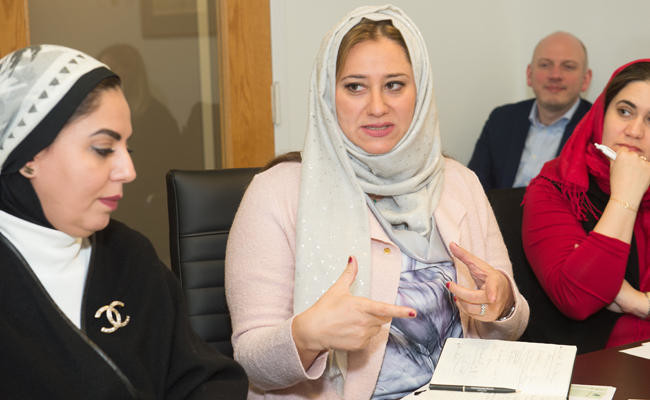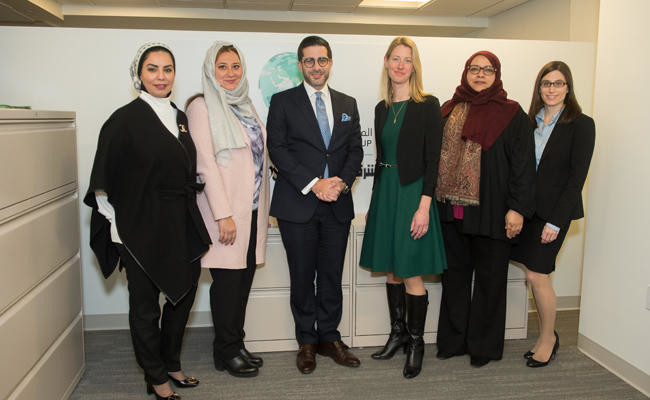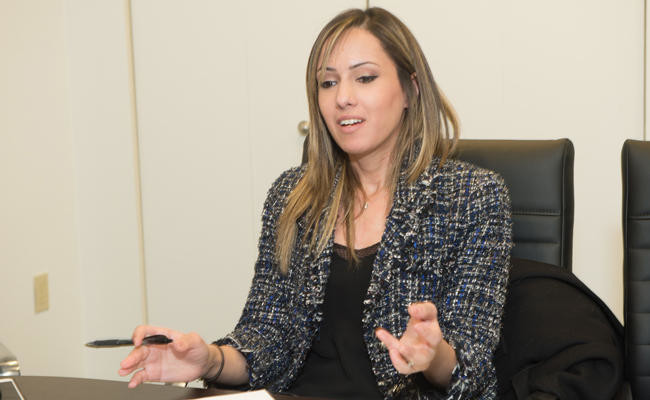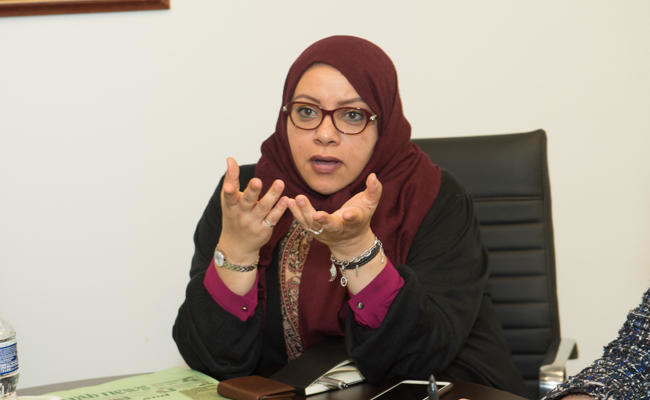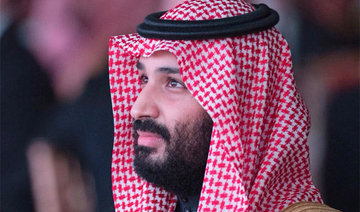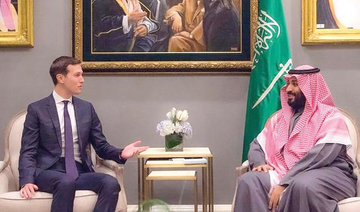WASHINGTON: All Saudis have a personal oil well in their back yard, women from the Kingdom are widely repressed and definitely cannot speak English, and all Americans play beach volleyball.
These are just some of the common stereotypes raised by panelists at an Arab News roundtable discussion held in Washington on Friday, in which women from Saudi Arabia and the US debated public views about their nations and how misperceptions can be addressed.
The discussion, held during the visit by Saudi Crown Prince Mohammed bin Salman to the US, heard about both perceptions of citizens of the two countries and about the societies as a whole.
Kerry Boyd Anderson, a US-based political risk consultant and writer, said that Saudi Arabia still struggled with an image problem in the US — although she said that the visit by the crown prince was important in addressing this.
“Saudi Arabia is still struggling with the post-9/11 perception problem in the United States … Even though those of us who actually follow the Middle East know there has been massive change,” she said.
“It’s going to take a lot of effort if you actually want to change American perceptions.”
Allegations about Saudi Arabia’s human rights record were also raised as impacting American public perceptions, Boyd Anderson said. But the move to allow women to drive from this summer provided an image boost, she added.
“A lot of Americans tend to think of Saudi women as very repressed. And I think that the move to allow women to drive … was very important for a lot of Westerners to see. Because it was always the thing a lot of people would talk about,” she said.
The roundtable discussion was the first event to be held in the recently inaugurated Saudi Research and Marketing Group office in Washington, which will be home to Arab News’ planned bureau in DC. The discussion, titled “Vision 2030 and the Role of Women in Saudi Reforms,” was moderated by Faisal J. Abbas, editor in chief of Arab News.
Somayya Jabarti, the editor in chief of Saudi Gazette, said that the move to allow women to drive was just the start of reforms for women in her country.
“This is the beginning. The decision (to allow) women to drive was for practical reasons mostly. It wasn’t to improve the image of Saudi Arabia or to justify ourselves,” she said.
“I think the next step, which is much more important, concerns the male guardianship system, which I believe is sort of being dismantled, bit by bit. Which I also think is a very intelligent approach, so it doesn’t provoke the challenging forces.”
Under the male guardianship system, Saudi women must receive permission for certain activities, such as traveling abroad.
But Jabarti said that the system had been misinterpreted by the international media, with claims that women cannot, for example, open a bank account or gain access to health care without permission.
“The Western media seems to get it wrong when it comes to what we can do and cannot do in relation to the male guardianship system,” she said.
Other members of the discussion group also pointed to the media’s role in covering Saudi society. Rania A. Razek, a Saudi-American photographer, said the global media has only intermittent interest in Saudi women’s affairs.
“It’s as if it’s a snooze on an alarm clock. Once something happens, a woman does something, it goes on the media for one day, and then it’s snoozed for another two years. And then something else happens, a woman does something else and it’s news, and then the world sees it once and then forgets it,” she said.
Jabarti said that, despite the easing restrictions on women in Saudi Arabia, hers is not the first generation to thrive.
“It isn’t (only) now that women are becoming doctors, academics and scientists. We’re not even part of the pioneering generation of women professionals in Saudi Arabia. We’re part of maybe the third or the fourth … Regardless of all the restrictions that have existed, women have achieved. So I think we need to give credit to the women who have come before us,” she said.
She said that there are other misconceptions and stereotypes about Saudis. “We still get the ‘oil well in your back yard’ (comments) … The stereotype that we’re all rich,” she said. “(Some) people are surprised that I’m Saudi and I speak English.”
Dr. Mody Al-Khalaf, Shoura council member and former diplomat at the Saudi Embassy in US, discussed the council’s involvement in an anti-harrassment law for women.
She also raised the recent CBS interview with the Saudi crown prince, in which he acknowledged that Saudi women “still have not received their full rights. There are rights stipulated in Islam that they still don’t have.”
Al-Khalaf said: “He was very honest about women not having all their rights within Shariah. That was the first time, for me, to hear an authoritative figure say, ‘Yes, women in Saudi Arabia still do not have all their God-given rights’.”
Lina Al-Maeena, Shoura council member and women’s sports enthusiast, explained how the Shoura is a consultative council for the king, giving recommendations and assessing and amending existing laws.
But she dismissed the “stereotype” that female members of the Shoura only involve themselves in issues connected to women’s affairs. “We should be the voices of everybody in the Kingdom,” she said.
But stereotypes work both ways, she added — such as the notion that all Americans enjoy beach volleyball.
“A lot of people don’t realize that a lot of American families are very conservative, they are very religious,” said Al-Maeena.
Conversely, not everyone in Saudi Arabia is as conservative as some might think, another member of the discussion group said.
The US-based Dr. Ellen Wald, energy consultant and author of the book “Saudi, Inc.,” pointed out that women already drive cars in Saudi residential compounds attached to the energy company Aramco.
“Most people I’ve spoken to have no idea that women at Aramco do drive in the Aramco area (and) don’t wear abayas,” Wald said. “There’s a lot of things that people don’t know.”
Faisal J. Abbas, editor in chief of Arab News, said that there was too much attention paid to what women wear regardless of whether they are from Saudi Arabia or San Francisco.
“In all societies there is an obsession with what women wear, be it too little or too much. Let’s stop judging women on what they wear, and let’s start judging them on what they do,” he said.
The roundtable discussion also put forward some recommendations for how to improve perceptions.
Wald said that she had found it difficult to get a visa to Saudi Arabia despite spending years researching a book on the country.
Easing such restrictions, as well as providing more efficient embassy services and information, would all help improve public perceptions, Wald added.
“I called the Saudi Embassy so many times to try to talk to them about a visa, and no one would up the phone,” she said. “There’s no information for Westerners about going … There are no guidebooks about Saudi Arabia.”
Ola Salem, head of communications at the Washington-based Arabia Foundation, said that access to Saudi Arabia for the media was also important.
“Journalists have access to Dubai and the UAE so much easier than Saudi Arabia. That’s why you don’t see (many) pictures of women from Saudi Arabia, because (the media) can’t get it,” she said.
Saudi, US women discuss stereotypes, common challenges at Arab News DC roundtable
Saudi, US women discuss stereotypes, common challenges at Arab News DC roundtable

Saudis are ditching screens for face-to-face fun

- Tabletop games bring families together for unplugged fun and real connections
RIYADH: In a screen-saturated world where social interactions often shrink to notifications, analog fun is reshaping Saudi leisure. Board games, once dismissed as childish relics, are experiencing a revival across the Kingdom. Whether at home, in cafes, or at traditional majlis gatherings, Saudis are increasingly turning to tabletop games for fun, connection and cultural relevance.
What began as a simple form of entertainment during family nights or holidays has grown into a social phenomenon, with games like Jackaroo, Sequence and locally designed options such as Saudi Deal, Elaab Bel Khames (Play With Five), La Tagool (Don’t say), and Ensan, Hayawan, Khashaabalan (Person, Animal, Nonsense) now staples in Saudi homes.

“It became a trend because people miss real-life connection,” said Roaa Al-Johani. “Playing face to face just hits different, especially these days.”
This sentiment is echoed across Saudi homes, where board games have moved from being a once-in-a-while pastime to an essential part of gatherings.
I’d love to see games that tell stories from our culture or dive into Saudi history in a fun, modern way.
Wojoud Aziz
“Board games are a big part of our culture now,” Al-Johani added. “You see them in cafes — some cafes are fully built around them. Every Saudi home probably has either a Jackaroo or a Carrom board, especially after the (pandemic) era.”
During the pandemic, with more people spending time at home and looking for ways to unplug from screens, tabletop games offered a low-tech yet highly engaging alternative.

Al-Johani shared how her own family embraced this shift: “I come from a family that loves board games to the point that my grandpa has a Jackaroo board in his majlis and invites his friends and neighbors to play. It’s kind of how we bond — when we play, age doesn’t really matter.”
The appeal lies in the shared experience. Unlike video games, which are often isolating or limited to a few players, board games bring people together physically and emotionally.

“Even though I’m a hardcore gamer, I still prefer board games sometimes,” she said. “It’s really about the people you’re with — not just the game. The vibes, the laughs, the face-to-face time … it just feels more real.”
Norah Shobili, who recently tried Jackaroo, was similarly surprised by how engaging it was. “I used to think it was a kid’s game because they were the only ones playing it, but once I learned it, it was genuinely fun!”
People miss real-life connection. Playing face to face just hits different, especially these days.
Roaa Al-Johani
More than the gameplay itself, Shobili highlighted the intergenerational aspect of local games. “Back when Monopoly was the trend, kids wouldn’t play with elderly, because they’re kids they don’t know how to play, but with Jackaroo you see the elders team up with the young ones because they’re very good!”
Wojoud Aziz said that Saudi-made games resonate deeply with local culture: “They speak our language — literally. The humor, the names, the style — it all feels like home. You can tell they’re made by people who understand our culture and how we hang out.”
According to Aziz, board games are now a fixture in Saudi social life. “They weren’t always this big, but now? They’re part of the plan. I always see people playing them during family gatherings or chill hangouts.
“It gets super competitive but in a fun way, and everyone’s into it — even those who don’t usually play games.”
While most local games focus on fun, she believes there is more to them than meets the eye. “Some games really push you to focus, plan ahead and even read other players’ vibes. It’s low-key educational, too, but without making it feel like school, you know?”
The social value of these games is clear. “Board games have the advantage of being present with your family — if not verbally then at least physically,” Shobili said. “The whole family in one room, and as long as whoever you call will answer, that’s more than enough to spend quality time for me. It’s more about being there rather than doing something or talking.”
She also believes that Saudi game developers can take creative liberties, as long as they do not lose what matters most. “As long as they preserve the spirit of gatherings — being able to play as a big group regardless of age — they can develop however they want.”
That inclusivity is crucial. “Not all international games are translatable,” she said.
Looking ahead, both players and creators hope to see more storytelling and cultural depth in locally made games. “I’d love to see games that tell stories from our culture or dive into Saudi history in a fun, modern way,” Aziz said. “Something that mixes nostalgia with creativity — and hopefully goes global.”
As Saudis seek richer, more engaging ways to connect with friends and family, board games have become more than just entertainment — they are a bridge between generations, a spark for laughter, and a reason to put phones down and just be present.
The golden legacy of Saudi Arabia’s Eastern Province artisans

- As Saudi Arabia’s economy grew and diversified, many goldsmiths pivoted from hands-on crafting
RIYADH: Saudi Arabia’s Eastern Province has, historically, been a hub for the making of gold jewelry. Families in Al-Ahsa and Qatif have been passing down this intricate art for centuries, forging the region’s cultural identity and fueling its commerce.
While some artisans have shifted to gold trading or other careers amid the Kingdom’s economic transformation, many continue to practice their craft, according to the Saudi Press Agency.
Mohammed Al-Hamad, former head of the Gold and Jewelry Committee at the Asharqia Chamber of Commerce and Industry, shared insights into the historical development of this profession in an interview with the SPA.

Al-Hamad comes from a long line of jewelry manufacturers and gold traders. He described the traditional methods of shaping gold using rudimentary tools to create distinctive jewelry. He explained that the traditional goldsmithing process began with melting gold in a crucible over hot coals using a leather bellows, followed by shaping it with a hammer and anvil, the essential tools of the trade.
According to Al-Hamad, early goldsmiths were not only skilled artisans but also adept merchants, engaging directly with customers in their shops, selling their creations, and reworking precious metals brought in by patrons.
Some even traveled extensively to trade in used gold, silver, and the gold embroidery of traditional cloaks (bisht), using scales and traditional weight measurements before the widespread adoption of the gram system.
FASTFACT
Early Saudi goldsmiths were not only skilled artisans but also adept merchants, engaging directly with customers in their shops and reworking precious metals brought in by patrons.
Transactions were often based on trust, with gold frequently sold on credit or entrusted to the goldsmith for repair or modification.
Al-Hamad recalled that, as a child, he accompanied his father to purchase a 10-tola gold ingot —about 116 grams — for SR 600, a hefty sum back then.
He also mentioned a remarkable relic of the craft’s storied past — a legal document more than 200 years old recording the sale of a gold sandal, a testament to the artistry’s deep roots in the Eastern Province.
Artisans, he said, often crafted their own specialized tools and displayed their finished pieces in a traditional box known as a matbakah.
As Saudi Arabia’s economy grew and diversified, many goldsmiths pivoted from hands-on crafting. Some opened shops, workshops, or even factories, while others pursued opportunities in national companies or government positions.
Al-Hamad sees his generation as a bridge, connecting the days of pure handcrafting to a new era of gold trading and specialized workshops.
Jaafar Al-Nasser, a young electrical engineering graduate from the US, chose to carry forward his family’s goldsmithing legacy, the SPA reported.
He has built a factory packed with cutting-edge technology. Al-Nasser said that the gold and jewelry industry has transformed dramatically, shaped by economic, cultural, and social shifts, particularly greater exposure to international cultures.
This change has sparked customer demand for unique designs, encouraging jewelers to use advanced machinery to innovate.
Al-Nasser said soaring gold prices have hit the industry hard. Larger pieces are costlier to craft, pushing designers to create lightweight jewelry. This focus on minimal weight is a core goal for today’s manufacturers, he noted — a delicate balance of artistry and practicality driving this traditional craft forward.
Saudi, Egypt transport ministers discuss enhancing cooperation

- The two sides discussed opportunities for developing partnerships in various transportation activities
RIYADH: Saudi Minister of Transport and Logistics Services Saleh Al-Jasser met Egyptian Deputy Prime Minister for Industrial Development and Minister of Industry and Transport Kamel El-Wazir recently in NEOM.
During the meeting, the two sides discussed opportunities for developing partnerships in various transportation activities, along with exchanging expertise in infrastructure, port connectivity and facilitating trade exchange, the Saudi Press Agency reported.
The Egyptian minister’s visit included a series of meetings and sessions, along with a meeting with officials in NEOM, where future projects were reviewed, and cooperation opportunities in maritime transport and modern technologies were explored.
Saudi Arabia promotes cinema, talent at Beijing festival

- The commission’s goal is to promote Saudi films and local talent and demonstrate the growth of the Kingdom’s film industry, while fostering collaboration with Chinese and Asian film sectors
RIYADH: The Saudi Film Commission is taking part in the Beijing International Film Festival, being held in the Chinese capital from April 19-22.
Its presence reflects the organization’s commitment to expanding the global presence of Saudi cinema, according to the Saudi Press Agency.
Launched in 2011, the Beijing International Film Festival is a leading event in Asia and globally, promoting cultural exchange and cinematic dialogue.
There is a Saudi pavilion for the commission and its partners, offering a platform to engage with visitors and filmmakers and emphasizing creative and investment opportunities in the Kingdom.
The program also features a special screening of “Norah,” which highlights local talent and the richness of Saudi Arabia’s artistic content.
The commission’s goal is to promote Saudi films and local talent and demonstrate the growth of the Kingdom’s film industry, while fostering collaboration with Chinese and Asian film sectors.
It also aims to position Saudi Arabia as a key destination for filmmakers and expand international partnerships, with the hope of cementing its place on the global cinema map.
Japanese nanotube pioneer inspires Saudi youth at Riyadh science oasis

- The session included participation from several high school students
- Known as the father of carbon nanotubes, his 1991 discovery revolutionized the field of nanotechnology
RIYADH: King Salman Science Oasis in Riyadh hosted a scientific discussion featuring Japanese professor Sumio Iijima, the discoverer of carbon nanotubes and recipient of the 2025 King Faisal Prize in Science.
The session included participation from several high school students, along with various scientists and specialists, the Saudi Press Agency reported.
The event was part of the center’s initiatives aimed at enhancing communication between scientists and younger generations, and inspiring students to engage in scientific research and innovation.
During the session, Iijima shared his academic journey and the early challenges he faced, discussing the motivations that led him to discover carbon nanotubes using an electron microscope.
Known as the father of carbon nanotubes, his 1991 discovery revolutionized the field of nanotechnology. His efforts established a new field in solid-state physics and materials science.
The discussion also addressed the importance of nanomaterials for future applications and their use in diverse fields such as electronics, energy storage and biomedicine. His discovery laid the foundation for countless technological innovations in the 21st century.
Iijima answered numerous questions related to scientific research and offered advice and encouragement to those interested in science and technology.
King Salman Science Oasis is a leading national initiative dedicated to promoting scientific culture and stimulating creativity and innovation across all segments of society.


